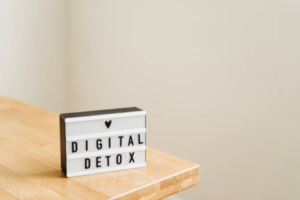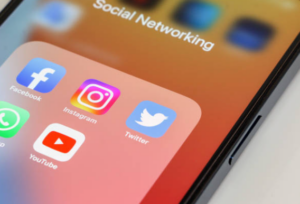In Search of Balance

In an era dominated by digital technology, the concept of taking a break from our screens and devices, known as a digital detox, has gained significant attention. From social media platforms to endless scrolling through news feeds, our constant connectivity has raised concerns about its impact on mental health. But are digital detoxes merely a passing trend, or are they indeed essential for promoting mental wellness in the digital age? In this blog, we’ll explore the concept of digital detoxes, their potential benefits, and whether they’re truly necessary for our mental well-being.
Understanding Digital Detox
A digital detox refers to a period during which individuals intentionally refrain from using electronic devices such as smartphones, computers, tablets, and social media platforms. This detox can range from a few hours to several days or even weeks, depending on individual preferences and goals. The aim is to disconnect from the digital world and instead focus on activities that promote relaxation, mindfulness, and personal connection.
The proliferation of digital technology has profoundly transformed the way we live, work, and interact with the world around us. While advancements in technology have undoubtedly brought numerous benefits, including instant communication, access to information, and enhanced productivity, they have also introduced new challenges and complexities to our lives.
- Information Overload: The constant influx of emails, notifications, and social media updates bombards our senses, leaving us overwhelmed and mentally exhausted. The sheer volume of digital content vying for our attention can lead to cognitive overload and difficulty in focusing on tasks.
- 24/7 Connectivity: The expectation of constant connectivity in today’s digital age blurs the boundaries between work and personal life, making it challenging to switch off and unwind. The pressure to be always available and responsive to digital communications can disrupt our ability to relax and recharge.
- Social Comparison and Validation: Social media platforms, while designed to connect people, often foster a culture of comparison and validation. The curated nature of social media feeds can exacerbate feelings of inadequacy, as individuals compare their lives to carefully curated representations of others, leading to decreased self-esteem and increased anxiety.
- Digital Distractions: The addictive nature of digital devices and online content makes it easy to succumb to distractions, detracting from more meaningful pursuits and experiences. The constant temptation to check notifications, scroll through news feeds, or binge-watch videos can hijack our attention and prevent us from fully engaging in the present moment.

Benefits of Digital Detoxes
- Reduced Stress and Anxiety: The constant barrage of notifications, emails, and social media updates can contribute to heightened levels of stress and anxiety. Digital detoxes provide a much-needed break from the relentless stream of information, allowing individuals to step back, relax, and recharge. By disconnecting from digital devices, individuals can create a sanctuary of peace and quiet, free from the pressures of constant connectivity. This respite from digital stimuli enables the nervous system to unwind, leading to decreased cortisol levels and a greater sense of calm.
- Improved Sleep Quality: Exposure to the blue light emitted by screens can disrupt the body’s natural sleep-wake cycle, leading to difficulties falling asleep and staying asleep. Digital detoxes, particularly in the hours leading up to bedtime, allow individuals to minimize their exposure to screens and create a conducive environment for restful sleep. By replacing screen time with calming activities such as reading, meditation, or gentle stretching, individuals can signal to their bodies that it’s time to wind down and prepare for sleep. As a result, they may experience deeper, more restorative sleep and wake up feeling refreshed and rejuvenated.
- Enhanced Mental Clarity and Focus: Constant multitasking and information overload can take a toll on cognitive function, leading to decreased mental clarity and focus. Digital detoxes provide an opportunity to declutter the mind and sharpen mental acuity by eliminating distractions and allowing individuals to concentrate on one task at a time. By unplugging from digital devices, individuals can engage in activities that promote mental clarity, such as journaling, brainstorming, or deep reflection. This focused attention can lead to increased productivity, creativity, and a greater sense of accomplishment.
- Strengthened Relationships: In today’s hyper-connected world, it’s all too easy to prioritize virtual interactions over face-to-face connections. Digital detoxes encourage individuals to reevaluate their relationships and invest time and energy in nurturing meaningful connections with loved ones. By disconnecting from screens, individuals can engage in quality time with family and friends, whether it’s sharing a meal, going for a walk, or simply having a heartfelt conversation. These moments of genuine connection can strengthen bonds, deepen intimacy, and foster a greater sense of belonging.
- Heightened Awareness and Presence: Digital distractions often pull us away from the present moment, causing us to miss out on the richness of life unfolding around us. Digital detoxes offer an opportunity to reconnect with the here and now, cultivating a greater sense of mindfulness and presence. By unplugging from screens, individuals can fully immerse themselves in sensory experiences, whether it’s savoring the taste of a delicious meal, appreciating the beauty of nature, or relishing in the company of loved ones. This heightened awareness allows individuals to find joy and meaning in the simple pleasures of life, leading to a deeper sense of fulfillment and contentment.
- Promotion of Healthy Habits: Digital detoxes often go hand in hand with the adoption of healthy lifestyle habits, such as regular exercise, nutritious eating, and adequate rest. When individuals disconnect from screens, they free up time and mental energy to engage in self-care activities that nourish their bodies, minds, and spirits. Whether it’s going for a run, preparing a wholesome meal, or practicing relaxation techniques, digital detoxes provide a fertile ground for the cultivation of healthy habits that support overall well-being.

Challenges of Digital Detoxes
While the benefits of digital detoxes are compelling, it’s essential to acknowledge the challenges associated with unplugging in today’s digital-centric world. Some common challenges include:
- Fear of Missing Out (FOMO): One of the primary challenges of digital detoxes is the fear of missing out on important updates, events, or social interactions. In today’s hyper-connected world, where social media platforms provide constant streams of updates and notifications, individuals may worry that disconnecting from their devices will cause them to miss out on significant news or opportunities. This fear of missing out (FOMO) can create a sense of anxiety and reluctance to engage in digital detoxes, as individuals fear being left behind or excluded from social circles.
- Dependency on Technology: Another challenge of digital detoxes is the pervasive dependency on technology in various aspects of modern life. From work-related tasks to social interactions and entertainment, digital devices have become integral tools for communication, productivity, and leisure. Breaking away from this dependency can be difficult, especially for individuals whose professions or personal lives are deeply intertwined with digital platforms. The reliance on technology for essential tasks may deter individuals from fully disconnecting during digital detoxes, leading to feelings of frustration or guilt.
- Social Pressure: In a society where online presence and digital connectivity are often equated with success and social validation, individuals may face social pressure to remain constantly accessible and active online. The pressure to maintain a strong digital presence and respond promptly to messages, emails, and notifications can create a sense of obligation to stay connected, even during attempts at digital detoxes. Additionally, individuals may fear judgment or criticism from peers or colleagues for disconnecting from digital platforms, leading to hesitation or reluctance to engage in digital detoxes.
- Accessibility: The omnipresence of digital devices and the internet makes it challenging to fully disconnect, even during attempts at digital detoxes. From work-related responsibilities to essential communications and information, individuals may find it difficult to completely disengage from their digital devices. The constant accessibility of digital technology means that individuals may feel compelled to check their devices periodically, even when trying to take a break from screens. This constant temptation to remain connected can undermine the effectiveness of digital detoxes and make it challenging to achieve a true sense of detachment.
- Withdrawal Symptoms: Just like any other habit or addiction, excessive use of digital devices can lead to withdrawal symptoms when individuals attempt to cut back or take a break. Common withdrawal symptoms associated with digital detoxes include feelings of restlessness, irritability, anxiety, and difficulty concentrating. These symptoms may arise as individuals experience a temporary disruption in their usual digital routines and adjust to the absence of constant screen time. Managing these withdrawal symptoms requires patience, self-compassion, and the implementation of coping strategies to support the transition to a more balanced relationship with technology.

Incorporating Digital Detoxes into Daily Life
Despite the challenges, incorporating digital detoxes into our daily lives is achievable with mindful planning and intentionality. Here are some practical tips for integrating digital detoxes into your routine:
- Set Boundaries: Establish clear boundaries around your screen time by designating specific times of the day for digital usage and periods of unplugged activities. Communicate these boundaries to friends, family, and colleagues to manage expectations.
- Create Tech-Free Zones: Designate certain areas in your home, such as the bedroom or dining area, as tech-free zones where electronic devices are not allowed. This creates opportunities for uninterrupted quality time with loved ones and promotes relaxation and restful sleep.
- Practice Mindfulness: Incorporate mindfulness practices into your daily routine, such as meditation, deep breathing exercises, or mindful walks in nature. These activities help cultivate awareness and presence, making it easier to disconnect from digital distractions.
- Engage in Offline Activities: Explore hobbies and activities that don’t require digital devices, such as reading physical books, cooking, gardening, or pursuing creative endeavors. Engaging in offline activities not only provides a break from screens but also promotes personal growth and fulfillment.
- Prioritize Human Connection: Make an effort to prioritize face-to-face interactions and meaningful conversations with friends and family. Schedule regular social outings or gatherings where digital devices are kept out of sight, allowing for genuine connection and bonding.
In conclusion, while digital detoxes may initially seem like a trendy fad, their importance for promoting mental wellness in today’s digital age cannot be overstated. By disconnecting from screens and digital distractions, individuals can reduce stress, improve sleep quality, enhance productivity, and foster deeper connections with themselves and others. While the challenges of unplugging are real, integrating digital detoxes into our daily lives is achievable with conscious effort and intentionality. Ultimately, prioritizing moments of digital disconnection allows us to reclaim our time, focus on what truly matters, and cultivate a greater sense of balance and well-being in an increasingly digital world.




